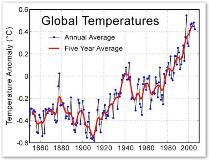 A leading Australian climate change scientist says experts are losing the fight against sceptics, who are distorting the science of global warming.
A leading Australian climate change scientist says experts are losing the fight against sceptics, who are distorting the science of global warming.
His comments come as a prominent British climate change sceptic tours the country.
Lord Christopher Monckton has arrived in Australia for a series of lectures and is calling for a royal commission into the science around global warming.
The former journalist and political adviser to Margaret Thatcher says the production of carbon dioxide is not a major problem.
He has attacked the United Nations Intergovernmental Panel on Climate Change (IPCC) after it revised a key finding in its 2007 report which wrongly claimed the Himalayan glaciers would melt by 2035.
But one of the lead authors of the report, Australian Professor Andy Pitman, has defended the overall conclusions of the report.
Professor Pitman was a lead author on the IPCC’s 2001 and 2007 reports. He is also the co-director of the Climate Change Research Centre at the University of New South Wales.
Professor Pitman says sceptics have used the IPCC’s error to skew the climate change debate.
“Climate scientists are losing the fight with the sceptics,” he said.
“The sceptics are so well funded, so well organised. “They have nothing else to do. They don’t have day jobs so they can put all their efforts into misinforming and miscommunicating climate science to the general public, whereas the climate scientists have day jobs and [managing publicity] actually isn’t one of them.
“All of the efforts you do in an IPCC report is done out of hours, voluntarily, for no funding and no pay, whereas the sceptics are being funded to put out full-scale misinformation campaigns and are doing a damn good job, I think.
“They are doing a superb job at misinforming and miscommunicating the general public, state and federal governments.”
And he says if scientists lose the climate change debate, it would be “potentially catastrophic”.
“If this was academic debate over some trivial issue [it wouldn’t matter],” he said.
“But this isn’t. This is absolutely a fundamental problem for the Earth that we desperately needed full-scale international action on a decade ago.
“We are now 10 years too late to stop some of the major impacts that we will see and have seen as a consequence of global warming. It is not a future problem, it is a problem here today, around us.”
Professor Pitman has accused sceptics of failing to base their arguments on the facts.
“Most of the climate sceptics, particularly those that are wandering around publicly at the moment, don’t base their arguments on science,” he said.
“They have probably never read the Intergovernmental Panel on Climate Change report; they aren’t writing papers in peer-reviewed literature.
“They don’t update their arguments when their arguments are shown to be false, so they’ll have no problem at all using this ammunition inappropriately and out of context to further their aims in exactly the same way as people did when they were trying to disprove the relationship between smoking and human health.”
Defending the IPCC
Professor Pitman has also played down the significance of the error in the IPCC’s report.
“There are two paragraphs that have been questioned in a 1600-page document,” he said.
“After two years, people have been going over that report with considerable care and have found a couple of errors of fact in a 1600-page document.
“I mean, we ought to be talking about the other 1599 pages that no one has found any problems with.”
Professor Pitman says he has no concerns about the IPCC’s reviewing process.
“We should be very clear on what the IPCC does. It writes a report that is fully open to external review. [Anybody] can each read over individual sections of the report and send in credible comments,” he said.
“So each government tries to pore over each of the statements to find fault with them and at the end of that process, future drafts are produced, again with opportunities for external examination and feedback.
“And you end up with a final report, which in this case some people have found one or two errors with after two years.
“I reckon that is a standard that most organisations would absolutely celebrate.”




